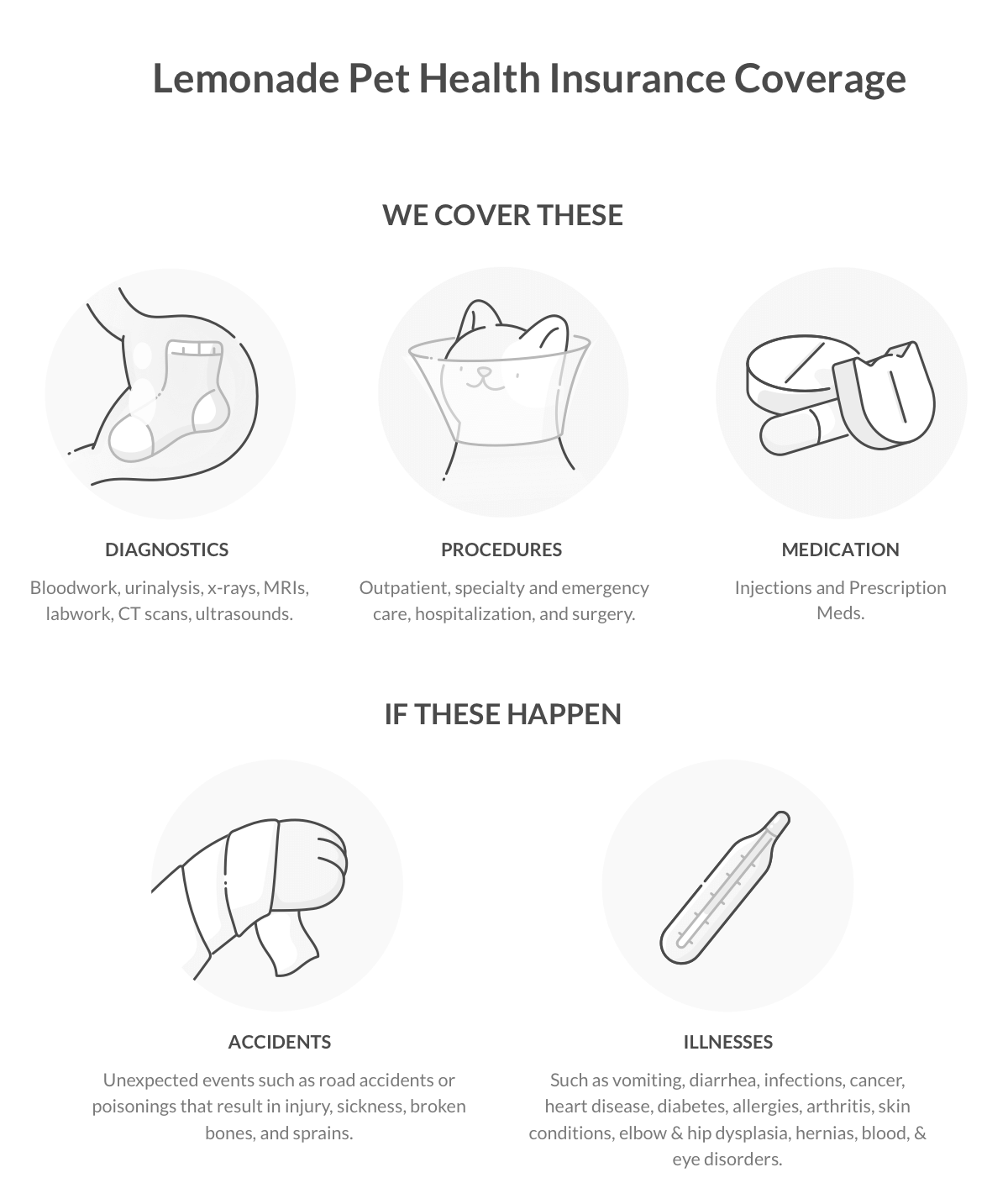Whether you consider yourself a canine expert or not, you can probably recognize a Labrador Retriever. Labs are famous for their unconditional loyalty, athletic ability, and playfulness. They’ll warm the hearts of any family.
If you’re a dog owner or are considering adopting, we’ll give you the rundown on the Labrador Retriever breed to see if they’re the right fit. We’ll take a look at breed basics, costs, common illnesses, and dig into Labrador Retriever pet insurance, like coverage offered by Lemonade.
Labrador Retriever Fast Facts
| Personality | Loyal, outgoing, gentle |
| Size | Medium/large |
| Weight | Male: 64–79 lbs. Female: 55–71 lbs |
| Average life span | 10–12 years |
| Lifestyle fit | House living, farm life |
| Average lifetime care costs | $22,000–$180,000 |
Labs are one of the most friendly dog breeds. They tend to get along with kids, strangers, and other pups. (Just warn your friends and family: Your Lab is a shedder and might leave them with a furry gift on their clothes or furniture.) Since Labs are so affectionate, they aren’t the best guard dogs. They might treat an intruder with kisses—adorable, but not super effective.
This breed is full of energy, so a home with a backyard is perfect for Lab living. Labs need at least 40 to 60 minutes of exercise each day; they’re easy to train, so part of that exercise can come from learning cool tricks.
A Lab will devour any grub they can get their paws on. So try extra hard to hide certain toxic foods from your hungry and curious pup. While a hard-working dog deserves a yummy treat, be careful to not overfeed your pup. Without moderation, Labradors have a tendency to become overweight.
What’s Labrador Retriever insurance?
Labrador Retriever pet insurance, like that offered by Lemonade, helps cover the costs of your vet bills. You pay a monthly premium and in exchange, you can keep your fur fam protected without stressing as much about the costs. A dog insurance policy covers a range of costs related to accidents, illnesses, and preventative care. At Lemonade, there’s even a special plan for puppies to help with all of your early pet parent costs, including spaying and neutering.
How much does it cost to own a Labrador Retriever?
Owning a Labrador Retriever can be expensive, with initial costs running between $400-$1,500.
When it comes to buying a Labrador Retriever, be very careful, and do your research. Only buy from a reputable breeder. Sadly, some breeders take advantage of the Labrador Retriever’s popularity while neglecting important health and temperament issues.
Since we recommend buying the Labrador Retriever from a reputable breeder, it may be hard to find trustworthy adoption options. Rescue Me is a great resource for all potential pet parents, and could help you find a mixed-breed pup that is part Lab. Plus, adopting a mixed-breed dog can help mitigate against breed-specific health issues—while giving a needy pup a second chance at life!

Start saving: During the first year, you’ll spend near $3,000 to get your new friend vaccinated, groomed, and insured. This price drops to around $1,900 for each year following. On average, Labrador Retrievers cost owners around $22,000 over their lifetime. But if you plan on spaying/neutering your dog, hiring a dog walker, purchasing pet insurance, and boarding your pup once a year, expect to pay anywhere from $70,000 to $180,000 over their lifetime.
What else should you know about Labrador Retrievers?
Deciding whether this dog breed is for you? Here are some Labrador Retriever health problems you may run into. We hope you never see your dog go through these. But if you do, it’s always a good idea to be prepared and know the signs.
Hip and elbow dysplasia are hereditary conditions common in many breeds. If your dog goes untreated, these diseases could cost you $1,500 to $6,000. Since these conditions are inherited, we recommend asking your breeder for certifications from the Orthopedic Foundation for Animals.
Along with other deep-chested dogs, Labrador Retrievers are at risk of bloat. Usually, it impacts dogs who rapidly eat large meals, chug too much water, or eat after working out. It is an unexpected, lethal condition that can develop rapidly, so it’s important to know the signs. If your dog is excessively salivating, throwing up without vomit, whining when his abdomen is touched, and suffering from a distended stomach, get them to the vet immediately.
Since Labs have long floppy ears that trap moisture in, they can easily get ear infections. This condition is easily treated, but dangerous if left untreated. So, it’s important to know the signs. Watch out for swelling, dark discharge, and a bad odor. We recommend regularly using ear cleaning solutions to prevent infections.
If your dog’s running on three legs or limping, she might have patellar luxation. It’s a painful condition that involves the knee joint shifting in and out of place. Most cases can be treated with pain medications, but some may require surgery.
Eye problems are common in a few forms. Rule of thumb? If you notice your Lab is itching a lot or has red eyes, schedule an appointment with your vet. The three main types of troubling eye issues are:
- Progressive retinal atrophy is a hereditary disease that eventually leads to blindness. We suggest you ask your breeder about the parent’s eye history to avoid this condition.
- Cataracts are a cloudy film that forms over the eye and causes blurry vision.
- Cloudy corneas can also be a symptom of glaucoma, a disease that puts pressure on your dog’s eye potentially causing loss of vision.
Osteochondritis dissecans (OCD) is an inflammatory condition that involves the uncommon growth of cartilage in joints. While OCD normally affects the shoulder joint, it’s possible for elbows, hips, and knees to be impacted. If you notice any lameness, limping, or swollen joints, call your vet for a check-up. In most cases, OCD can be treated with limited physical activity and extra rest.
Should you get your Labrador Retriever pet health insurance?
Labrador Retriever’s are at a higher risk of certain genetic health issues—which can be scary and lead to unexpected vet bills. Plus, it can be pretty expensive to pay for common first-year expenses like vaccinations for rabies and heartworm, checkups, and a spay or neuter procedure.
Dog insurance will give you peace of mind and keep your four-legged friend healthy. You can get a quote from your favorite insurance company in just a few minutes—it’s quick, simple, and even a little fun…
Why is Lemonade great for Labrador Retrievers?
With Lemonade pet insurance, pet parents can customize their policy to get the coverage their furry friend needs.
For starters, a basic Lemonade pet health insurance policy includes accident and illness coverage. This will help cover the costs of tests, treatments, and medication if your dog or cat has an unexpected accident or illness.

A base policy is great for the unexpected things in your fur fam’s future, but Lemonade also offers affordable preventative care, designed to keep your pet healthy, and helps cover expenses you’re probably already paying for. By adding a preventive care package to a Lemonade policy you’ll also get access to live medical chat and be covered for all types of routine care—like your annual wellness exam, checkups, blood tests, several vaccinations, and other routine health care for your pet.

A few quick words, because we <3 our lawyers: This post is general in nature, and any statement in it doesn’t alter the terms, conditions, exclusions, or limitations of policies issued by Lemonade, which differ according to your state of residence. You’re encouraged to discuss your specific circumstances with your own professional advisors. The purpose of this post is merely to provide you with info and insights you can use to make such discussions more productive! Naturally, all comments by, or references to, third parties represent their own views, and Lemonade assumes no responsibility for them. Coverage and discounts may not be available in all states.





